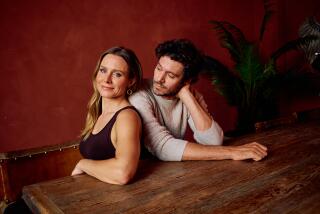Philip Bosco: The actor has logged five decades in film, TV and theater. For his role in ‘The Savages,’ he keeps sentiment at bay.
“Don’t tell anybody this, [but] we look upon moviemaking as a vacation,” Philip Bosco, 77, said from his home in Haworth, N.J. The multiple Tony nominee and one-time winner (in 1989, for “Lend Me a Tenor”) has spent five decades in New York theater, a career encompassing the American Shakespeare Festival at Stratford, Conn., George Bernard Shaw at Lincoln Center, Drama Desk trophies and Obies. The “we” he refers to includes his wife of 50 years, Nancy, a one-time literary manager at Circle-in-the-Square Theatre.
“I mean, good lord, they pick you up and drop you off and give you good money,” he said of the film business. “ . . . I did a movie; I won’t mention the name because I know I’ll get in trouble. I was shocked to see how [the lead actress] behaved to the director. I don’t understand, this lady is getting a fortune, how could she be so wicked and mean?”
Not so euphemistically, the Boscos call their home “the house that SAG built” -- paid for by roles such as industrialist Oren Trask in “Working Girl,” father parts in “Wonder Boys” and “My Best Friend’s Wedding,” and judges in “Nobody’s Fool” and on “Law & Order: Special Victims Unit.” But his latest film, “The Savages,” a low-budget, low-paying film by a director, Tamara Jenkins, whom Bosco hadn’t heard of, was not initially of interest.
The part of Lenny (an elderly father who’s slipped into a fog of dementia) offered its share of screen time but little dialogue. “The Savages” did have two surprising things going for it -- Laura Linney and Philip Seymour Hoffman, who were already attached to play Wendy and Jon, Lenny Savage’s kids.
Tonally similar to Jenkins’ first film, the cultishly successful “The Slums of Beverly Hills,” “The Savages” swirls around a theme not often brought to the big screen so soberly -- the complex chore that loved ones face when a parent becomes, in the dying stage, unwanted freight.
When Wendy and Jon are summoned back into their estranged father’s life to move him into a nursing home, they deposit Lenny in an institutional-seeming facility in wintry Buffalo, N.Y., near the college campus where Jon teaches the theater of Brecht. Wendy is guilty about it all, and Jon is coldly pragmatic. The movie finds humor in this dichotomy, but it is Bosco, the progenitor of this bemused pair, who is the film’s truly resonant presence.
There is scant exposition about Lenny’s background as a father. It is possible he was abusive, though his kids still feel a familial tug in his mute presence. Ultimately, Bosco’s performance is convincing for its lack of romanticism -- whether in acts of infantile rage or gestures of tender connection.
In the scene Bosco read for the audition, the kids have taken their dad to a diner to ask him, gingerly, whether he wants to be kept alive on a breathing machine and what they should do with his body after he dies. Soon the siblings are arguing, as Lenny sits there bundled in his parka. “What’re you, a bunch of idiots?” he finally rumbles. “You bury me!”
Jenkins, who credits casting director Jeanne McCarthy for suggesting him, leaped from her seat and hugged Bosco when the audition was over. “Which wasn’t very professional, I’m sure,” she said. She’d had a prejudice, based on his credits, that Bosco would suggest a well-heeled patriarch, but he fully embodied the bluntness that would avoid any “cute-i-fication” of the Lenny character, what Jenkins calls the cliche of “the bastard with a twinkle in his eye.”
“The irony is he is the most unneurotic person you’ve ever met,” she said.
Asked about a possible Oscar nomination for best supporting actor, Bosco, whose more recent Broadway shows include “Twelve Angry Men,” “Copenhagen” and George Bernard Shaw’s “Heartbreak House,” said amiably: “It might get a nomination, I doubt it. Maybe they feel they have to have an older person in there to keep everyone honest.”
--
Where you’ve seen him
A fixture on the New York stage, where he earned his first Tony nomination in 1961 for “Rape of the Belt” and his latest in 2005, for “Twelve Angry Men,” Philip Bosco began getting nibbles from Hollywood when he was into his 50s. A turn in Mike Nichols’ “Working Girl,” was a catalyst for other parts. TV audiences might know him better from various “Law & Orders” (including a recurring role as Judge Joseph Terhune on “Special Victims Unit”)or FX’s “Damages.”
More to Read
Only good movies
Get the Indie Focus newsletter, Mark Olsen's weekly guide to the world of cinema.
You may occasionally receive promotional content from the Los Angeles Times.








